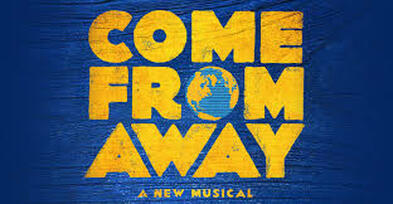 Singapore Some Sugar on Me because I LOVE IT HEREby Randi / May 7, 2019
Singapore Some Sugar on Me because I LOVE IT HEREby Randi / May 7, 2019It’s Theatre Thursday! A German Life is playing at London’s Bridge Theatre until May 11.
First of all, let me be clear that Maggie Smith is one of a handful of global treasures (pronounced tray-sure, like fellow old-lady-treasure Emily Gilmore). If she wanted to be an honorary Golden Girl I’d allow it. She’s the best. I love her. I wish her decades more of life and health and work.
A German Life is one of the most painful theatrical events I’ve ever had the non-playsure of experiencing. And not in a good ‘oh that was dramatic and heavy in a necessary way’ kind of painful. I mean it was torture. It was almost two hours straight of wondering in agony whether Maggie Smith was losing her short-term memory and forgetting lines (the thought of which was heartbreaking), or whether this was a purposeful choice for her character. Either way, it was painful to watch. It was hundo p when you visit an older person in a nursing home and you listen to their rambling stories and how it takes them a year to get out one sentence, and once they get the sentence out, they repeat it three times so they can figure out where they wanted to go from there and you’re just like OH MY GOD SPIT IT OUT but you can’t because that’s a horrible thing to think and say (when you aren’t talking to a Nazi).
And yes, all this means that Maggie was entirely successful in her portrayal (it had to be an acting decision, right, because Maggie Smith is still IN HER PRIME) of a 105-year-old woman. I mean, it’s incredible that a 105-year-old woman managed to communicate all that she did. But realism and accuracy in the portrayal doesn’t automatically make for good theatre.
What also doesn’t make for good theatre is that the show gets its message across in about 10 minutes, and the rest of the time is just playing that same one note for longer. And the message…isn’t enough. In A German Life, Maggie plays Brunhilde Pomsel, former secretary to Joseph Goebbels during WWII. The real Pomsel broke her silence at age 105 when she spoke to a group of filmmakers about her life. This play, by Christopher Hampton, is based on that. Maggie sits in a chair as Brunhilde and talks to us about her life like we are filming her for the documentary. The significance of her testimony is that she was a Nazi, who worked in Goebbels’ propaganda wing, who doesn’t think she did anything wrong. In her recounting of wartime, she spends more time explaining her favorite suit she got from Mrs. Goebbels than sharing anything she knew about what was happening in the war. It’s an effective portrait of willful ignorance, I’ll give it that. We spend this time with a self-involved person who hasn’t learned any lesson still, and so we are supposed to reflect on what makes someone ignore such atrocity, and what we would have done differently, if anything.
What bothers me about this show is how frustrated I am that the subtle messaging is not going to reach some people. Instead of thinking how horrifying it is that this woman still doesn’t get it, still thinks she was a victim for what she faced post-war, some people are going to go ‘hmm that really makes you think, there could be very fine people on both sides.’ I’m all for subtle theatre, but our audience needed to be told more clearly that Nazis were bad. I’m not joking. As usual, this show was a prime example of the disturbing humor of London audiences. Without fail, whenever there’s a soul-shocking line that would make normal humans breathe in sharply or widen their eyes or gasp, we’re with an audience that laughs. The most alarming example in my experience previously was when, in Caroline, or Change, Caroline told the young Jewish boy in her care that his people go to hell. It’s a big gasp moment. OUR AUDIENCE LAUGHED. And not in a nervous laughter way that some people on Broadway did; this was in a ‘oh that’s funny because making fun of Jews is funny’ way. Well, the Bridge audience at A German Life matched that distress by laughing every single time Maggie’s character made fun of Jews, especially their appearance, their penny-pinching ways, and especially when she motioned slightly at her nose to comment about Jews’ big noses. The audience roared. This is why anti-Semitism is back; it’s by popular demand.
And that’s why this show didn’t work for me and mostly frustrates me. It’s extremely subtle in its message, because all we get is her story and her words. It only works for people who know that the Nazis were bad and that anti-Semitism was, is, wrong. So, today, when more and more people don’t realize that anti-Semitism is wrong, they laugh along with Brunhilde like it’s their granny and then come away thinking ‘maybe not all Nazis were bad! She seemed fine!’ It’s ridiculous that I have to say this, today, but apparently we as a society haven’t reached the point where subtlety in anti-Nazi messaging makes any headway. I know some of you are like ‘you’re assuming all of that just because people laughed at the wrong things?’ No, I’m assuming all of that because of the conversations I have had every single day since 2016 about what is or is not anti-Semitic, and how often I’ve been told that just because something is anti-Semitic doesn’t mean it’s bad. When we still have people who are like ‘eh but Jews’, a restrained portrait of a non-actively-evil Nazi isn’t going to get through to anyone who needs it.
INFORMATION
I’ve previously raved about the human-friendly, modern design of the Bridge, but that was when I sat in the stalls. Sitting in the weird nether-region of the Gallery 1, which is really just more stalls at the back walls of the theatre, separated from the regular stalls by a half-step and a banister. It felt much more cramped than the regular stalls and at a weird side angle. Definitely won’t be sitting there again.
Infuriatingly, the show started 10 minutes late, in order to seat all latecomers. This is because this show has a policy of no admission or readmission once the show begins – but they also publicized the policy of ‘no latecomers allowed in’. Get your story straight! Don’t hold the curtain for people who are 10 minutes late, man alive.





